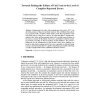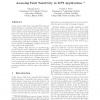114 search results - page 7 / 23 » Using likely program invariants to detect hardware errors |
SIGSOFT
2002
ACM
16 years 3 months ago
2002
ACM
Static checking can verify the absence of errors in a program, but often requires written annotations or specifications. As a result, static checking can be difficult to use effec...
134
click to vote
VTS
2007
IEEE
15 years 8 months ago
2007
IEEE
Conventional error correcting code (ECC) schemes used in memories and caches cannot correct double bit errors caused by a single event upset (SEU). As memory density increases, mu...
105
click to vote
TOOLS
2008
IEEE
15 years 8 months ago
2008
IEEE
Running unit tests suites with contemporary tools such as JUNIT can show the presence of bugs, but not their locations. This is different from checking a program with a compiler, w...
124
click to vote
ISSTA
2010
ACM
15 years 4 months ago
2010
ACM
SAT-based bounded verification of annotated code consists of translating the code together with the annotations to a propositional formula, and analyzing the formula for specifica...
127
click to vote
SC
2004
ACM
15 years 7 months ago
2004
ACM
Today, clusters built from commodity PCs dominate high-performance computing, with systems containing thousands of processors now being deployed. As node counts for multi-teraflo...


